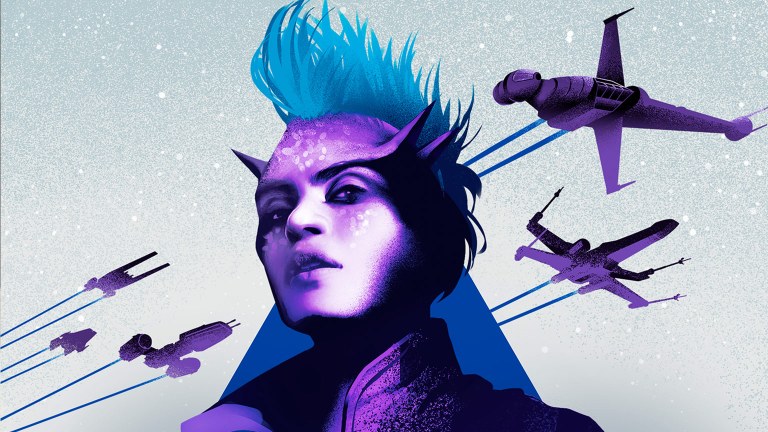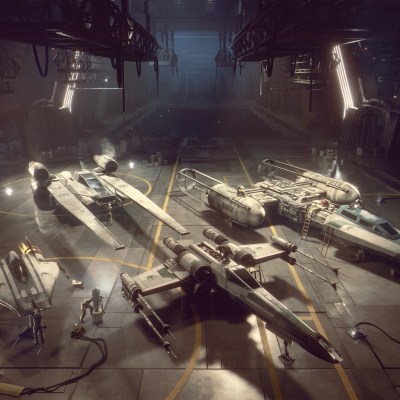Star Wars: Shadow Fall Review
Shadow Fall is the sequel to Alexander Freed's excellent Alphabet Squadron novel. This latest Star Wars story is a worthy follow-up.

Shadow Fall, the sequel to the novel Alphabet Squadron, yet again throws its original Star Wars characters into the fire in a grueling, well-constructed tale of war. The motley starfighter squadron, led by General Hera Syndulla and former Imperial pilot Yrica Quell, is still chasing the elite Imperial remnant TIE Fighter squad, Shadow Wing. When a battle on the planet Troithe strands both sides, they’ll have to fight their way out.
Author Alexander Freed’s signature style mixes precision and chaos. This is the opposite of Timothy Zahn’s keystone Star Wars novels, where the fantasy of Grand Admiral Thrawn is one of near-omniscient powers of perception. Characters in Freed’s Star Wars tend not to know whether their friends or foes are alive. People fight to achieve goals that the reader knows are already out of their grasps. People fight for absolutely no reason, determined to carry themselves forward on the strength of the imaginary narrative or losing team to which they’ve devoted themselves. People are motivated primarily by “frustration and anxiety.” All of this rarely translates into chaos for the reader. Instead, Freed’s carefully chosen observations and story structure usually enhance the characters’ confusion.
Only rarely are some scenarios unclear. In several cases, the pilots only reveal their mission several pages after it begins. This classic Star Wars in medias res structure doesn’t always work, muddling some of the action. But overall, the structure is tight and competent, the observations of even one-off characters and settings typically sharp. Every character is a wreck in their own way. But sometimes scenes cross the line from deliberate to slow, even moreso than in the very deliberate Alphabet Squadron.
When it comes to both pace and emotional content, this book is grueling. Would you like to read about someone dying slowly over a matter of pages? Now you can. Known in the fandom for stark death scenes and ashen emotional landscapes, Freed seems to have decided that his new technique for producing pain is to prolong the experience. “Death,” a character thinks early on, “was a broken promise.” Especially around the three-quarters mark, the story enters not so much a finale as a drawn-out exercise in dissecting characters and their relationships.
Many of those characters are well-developed. Chass in particular has solidified by book two into someone with a strong history and motivation. She’s forced to confront the way in which she grew up. In particular, she parses out the difference between fear and devotion. She considers how she used to think of “the constant fear of failure (fear of the consequences of failure), as something that was part of all families. Part of what it meant to love a community and feel responsible for its fate. Eventually, she’d learned better.” The book also examines her death wish without ever really getting rid of it. Unfortunately, Kairos, the most mysterious member of the squad, is absent for most of the book.
Wyl Lark, squadron soft boy, is not exempt from the trauma of war. He has developed the utterly false belief that he can form an alliance with Blink, one of the TIE Fighter pilots. In one of the best scenes in the first book, he briefly shared an open comm channel with his enemy. Now, tired of war and stressed to breaking, he’s obsessed with trying to talk to Blink and figure out what Blink wants. It’s a question that does not, and can never, have an answer — but it adds to Wyl’s character to see him misguidedly try to pursue it anyway.
The relationship between Wyl and Nath is one of the most stable in the book, and, while it was nice to see them together when the rest of the squad was scattered, it also made me wish the group dynamic overall had been allowed as much consideration. I’m still feeling the lack of groundwork from the first book, where the squad’s first few missions together were not shown.
One of the weaker points of the novel is Soran Keize, the Imperial commander. His motivation is clear: he sees himself as a fatherly protector of his pilots, one easily willing to be ruthless to ensure the survival of not the Empire as a political entity but his pilots as individuals. He wants to “restore Shadow Wing to glory” because of this.
At its best, the realism is chilling. Keize is so very far from conceiving of himself as a villain, even when he’s firing on civilians. But his straightforwardness is also the character’s weakness. I often found myself skipping around the details of his scenes, looking for the creepy Emperor’s Messenger that accompanies him. Star Wars has done an admirable job of refraining from the mustache-twirling Grand Moffs of the old Legends continuity and presenting blander, more banal evil. (See also the abusive Imperial bureaucrat in Resistance Reborn.) But there’s a point at which I want a reminder that I am in fact reading a Star Wars novel, not a historical one, and the very mundanity and reasonableness that made Keize frightening also sometimes made him boring.
While it’s mostly an ensemble series, the character with the most riding on her decisions is still Yrica Quell. Quell has basically been pretending to have had a moral code this whole time, and Shadow Fall cleverly forces her to confront the vacantness of her emotional and moral life. Quell faces a litany of her failures, her missed connections, people and situations with which she never had closure. Sections verge on horror as Quell makes her climactic decisions.
One of the things I love about Quell’s characterization is how awkward she can be. In one conversation in particular you can see exactly how she tries, and utterly fails, to make real connections to her squad members. There are some happy scenes here and there, which provide a slim glimmer of positive squad dynamics. But this book also argues harder than Alphabet Squadron that maybe Quell isn’t suited to rebellion and won’t ever be. She identifies with “a machine reliant on the ignorant and the desperate to earn its keep” shortly after murdering several people. It’s hard to keep track of what Quell wants when she isn’t even sure herself, but that isn’t a fault in the writing, in my opinion: that’s just how Quell is.
This is still a book about pilots, and delivers some exciting space battles and unexpected strategies. Freed has a knack for writing the physicality of how people are buffeted around during battle, although sometimes to a degree so extreme it throws me out of the story. Describing how a shock “resonated through her organs” doesn’t quite work.
Some scenes have great momentum and rhythm, with ground fights, in particular, being very compelling and smooth. The writing trusts readers to keep up: a sleeping gas is “invisible, non-lethal, and efficiently neutralized by a stormtrooper’s helmet filters.” Chass provides her own soundtrack, and the scenes of her flying a starship into an asteroid field listening to a ballad makes me desperately want to see this on screen and with sound.
Shadow Fall demonstrates not only how to chase characters up a tree, but how to set that tree on fire. No one seems safe in this book, which is one of its greatest strengths. I was often fearful for characters’ survival, but there’s a strong thesis buried in all that shame and grief and loss. So well-constructed that none of the seams show, it’s also extremely depressing to a degree that goes past catharsis into horror. Is it responsible to praise darkness as realism? Maybe not, but in a book that also mentions capital punishment, the difference between choice and motive, one-sided obsessions, and the banality of evil, I think it’s safe to praise this. Oh, and X-Wings are still very cool.


